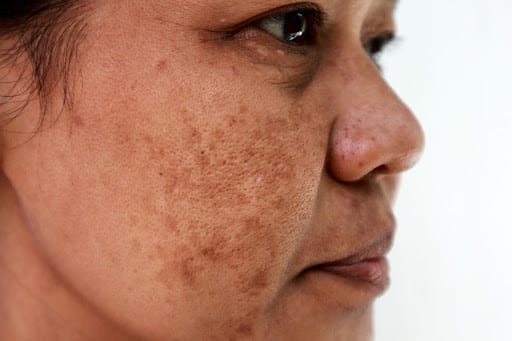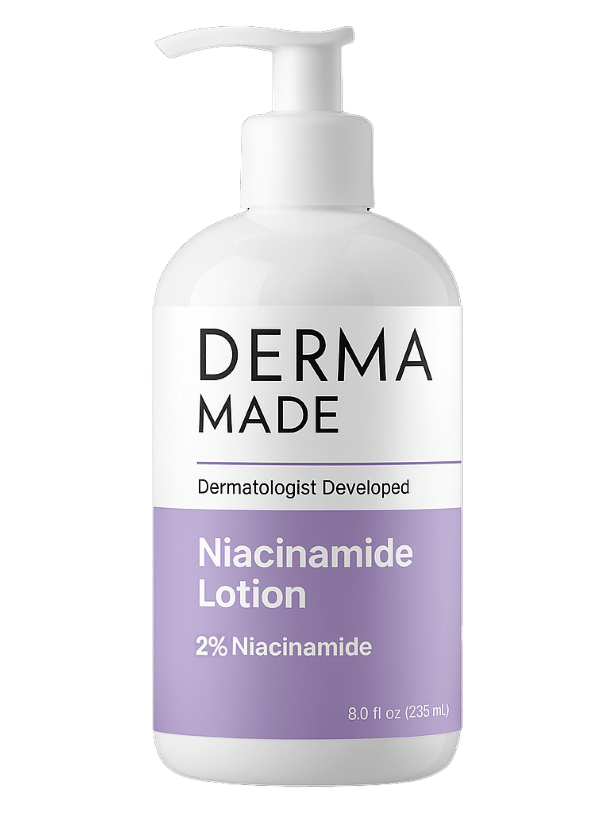Pesky dark spots on skin are seriously frustrating – they seem to stick around and take forever to fade. Some skincare ingredients claim to fade them quickly, but they can come at a cost to your skin health.
One is hydroquinone.
Many studies have found that hydroquinone can fade dark spots and melasma. However, this skincare ingredient is banned in Europe! European skincare is highly regulated with strict requirements for skincare safety.
Hydroquinone is not allowed in European skincare, prescription or otherwise, because hydroquinone is a possible carcinogen. Hydroquinone is banned in South Korea and Japan for similar reasons. Simply put, any benefits of lightening skin with hydroquinone are not worth the risk of carcinogen exposure.
Is it possible to lighten dark spots without hydroquinone? Yes – with niacinamide. Here’s how this skincare ingredient benefits your skin without any harmful side effects.
Niacinamide vs. Hydroquinone for Melasma & Dark Spots
Are there safe skincare products that work to fade melasma? Luckily, the answer is yes!
Niacinamide is a top skincare ingredient that effectively fades dark spots and melasma on skin.
Compared to hydroquinone, niacinamide is a skincare ingredient with zero cancer risk. Plus, it brings more than just melasma-fading benefits to your skin. Also known as Vitamin B3, it’s an ingredient that is natural and safe for skin.
How Does Niacinamide Fade Melasma?
Fading dark spots and melasma begins by interrupting your skin’s pigment-making process. As a reaction to inflammation, hormones, or sun damage, some parts of your skin will start creating extra melanin. Melanin is the pigment that adds color to your skin.
However, when you have patches of melasma and dark spots, your skin isn’t making melanin in an even way – it’s creating too much in some areas, making your skin look dark and patchy. That’s where niacinamide comes in!
Studies have found that niacinamide dramatically reduces melanosome transfer in the skin. Melanosomes are the cells that transport and create melanin. By partially stopping their processes, niacinamide can lighten dark spots and melasma for even-toned skin in as little as four weeks.
What Are the Benefits of Niacinamide for Skin?
When using niacinamide skincare for dark spots, a glowing skin tone isn’t the only benefit you’ll get from this skincare ingredient. Niacinamide also has an important job in keeping your skin hydrated.
This skincare ingredient helps your skin hold onto hydration, preventing dryness, sensitivity, and irritation. Niacinamide can also protect your skin from oxidative stress, holding off signs of premature aging such as wrinkles and lax skin.
Niacinamide vs. Hydroquinone: How Do They Compare?
You might think, is niacinamide as good as hydroquinone for fading melasma? Scientific studies have compared niacinamide and melasma for their power to lighten uneven skin tone to find out.
This study compared niacinamide and hydroquinone and revealed exciting results! Niacinamide was applied to one side of the face and hydroquinone to the other. After four weeks, there was no significant difference between how well they had worked.
Niacinamide helped to effectively fade melasma and dark spots with reduced skin irritation, making it an ideal skincare ingredient for patchy, uneven skin tone.
Niacinamide for Melasma: Key Ideas
When it comes to lightening melasma on skin, niacinamide is just as effective as hydroquinone with none of the risks. Niacinamide is an ideal skincare ingredient to fade dark spots and melasma because it interrupts the skin’s process of making too much pigment in skin, leading to tell-tale dark patches.
Niacinamide also benefits skin as a whole – not just for dark spots and blemishes – making it a must-have part of your skincare routine.







